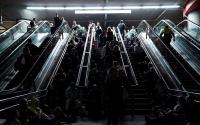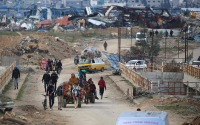26 December 2003The Independent
Rocked by the discovery of its first case of BSE and facing the collapse of its beef markets, the United States government came under further fire from scientists and agricultural experts yesterday. They said the lax oversight of the powerful cattle industry had made the arrival of BSE a virtual inevitability in the land of burgers and rib-eye steaks.
A shaken country reacted alternately with alarm, fear and defiance to the arrival of a disease many had assumed was a strictly foreign phenomenon. In industry circles, the Washington Holstein was quickly dubbed "the cow that stole Christmas".
While government officials and beef industry spokesmen sought to minimise the seriousness of the outbreak, which is restricted for the moment to a single dairy cow in Washington State, the experts said there had been far too little animal testing and inadequate precautions to prevent brain and nerve tissue from ruminants re-entering the cattle food chain.
Preliminary independent confirmation of the case was made after tests were carried at the Veterinary Laboratories Agency in Weybridge, Surrey. Professor Steven Edwards, chief executive of the laboratories, said the results had been passed to the US Department of Agriculture.
The results confirmed earlier US tests that the cow had suspected BSE. Final test results on the cow from Washington state are expected by the end of the week.
Stanley Prusiner, who won the 1997 Nobel Prize for Medicine for his work on prions, the rogue proteins believed to be at the root of bovine spongiform encephalopathy, said he had warned the Bush administration six weeks ago that an outbreak of BSE in the world's biggest beef producer was "just a matter of time". He told the New York Times that the administration had been "wilfully blind" to the threat, and that there was no way of knowing how widespread the problem was because so few animals were being tested.
The Bush administration sought to reassure the public that the risk of human contamination was negligible. "People should continue to feel very confident in the safety of our meat supply," the Secretary of Agriculture, Ann Veneman, told reporters. "The risk to human life is extremely low."
Ms Veneman also conceded that just 20,526 cattle had been tested for mad-cow disease last year, out of 35 million killed.
The news played havoc on financial markets, with shares in fast-food companies such as McDonald's and Wendy's plummeting and shares in Bio-Rad, a California bio-tech company responsible for a state-of-the-art test for BSE, gaining 20 per cent. Trade in beef futures in effect ground to a halt.
Fourteen countries announced that they were closing their borders to US beef products. They included Canada, which reported a single case of BSE in May, Japan, South Korea, Taiwan, Singapore, Australia and Russia.
It is too soon to tell if the single infected cow is a harbinger of a much more widespread problem. Canada has found no further cases after the discovery of a single infected cow in Alberta six months ago, and industry experts said yesterday it was possible the same thing would happen in the US.
The fact that it was a dairy cow mitigated the bad news. Dairy cows often receive lower-quality feed and are worked so hard that they become vulnerable to diseases.
"It's possible this is a spontaneous case. In a country with 100 million head of cattle, that's not out of the question," said Steve Bjerklie, editor of Meat Processing magazine. But the system had broken down. "Here we have the beef industry saying, 'hey, we found this mad cow, it proves the system is working,'" Mr Bjerklie added. "It may prove the system of detection is working, but the system for keeping BSE out is not working at all."
US government investigators are now busy trying to trace the origin of the four-and-a-half year old Holstein slaughtered in southern Washington State on 9 December. It is not known how many other cattle may have been exposed to the same feed assuming the problem originated in the feed or where they may have ended up.
The company which slaughtered the cow has voluntarily recalled more than 10,000lbs of beef a move that Ms Veneman said was taken out of "an abundance of caution".






